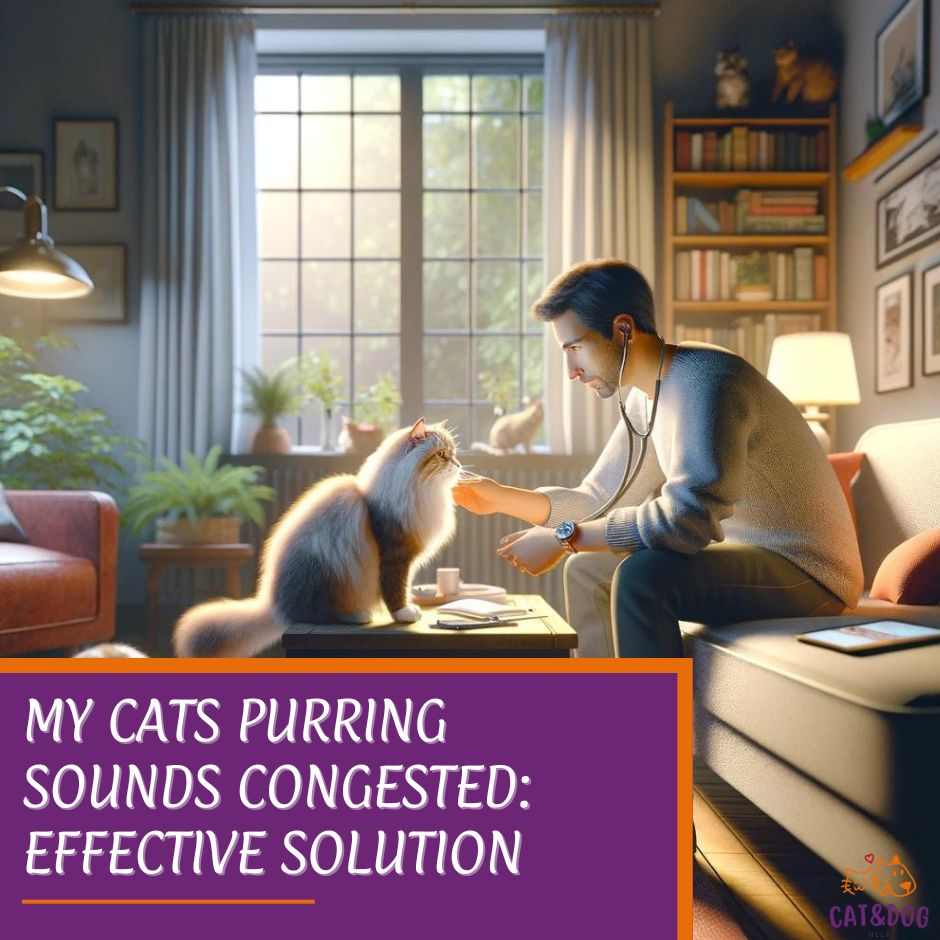Purring is often a sign of contentment in cats, or so you’d think, right?
However, if you’ve noticed your cat’s purring sounds more like a tiny tractor with a bad engine, it might be time to listen a little closer.
What does it mean when “my cats purring sounds congested”?
Could Fluffy’s quirky motorboat noise be a signal that something’s amiss with their health?
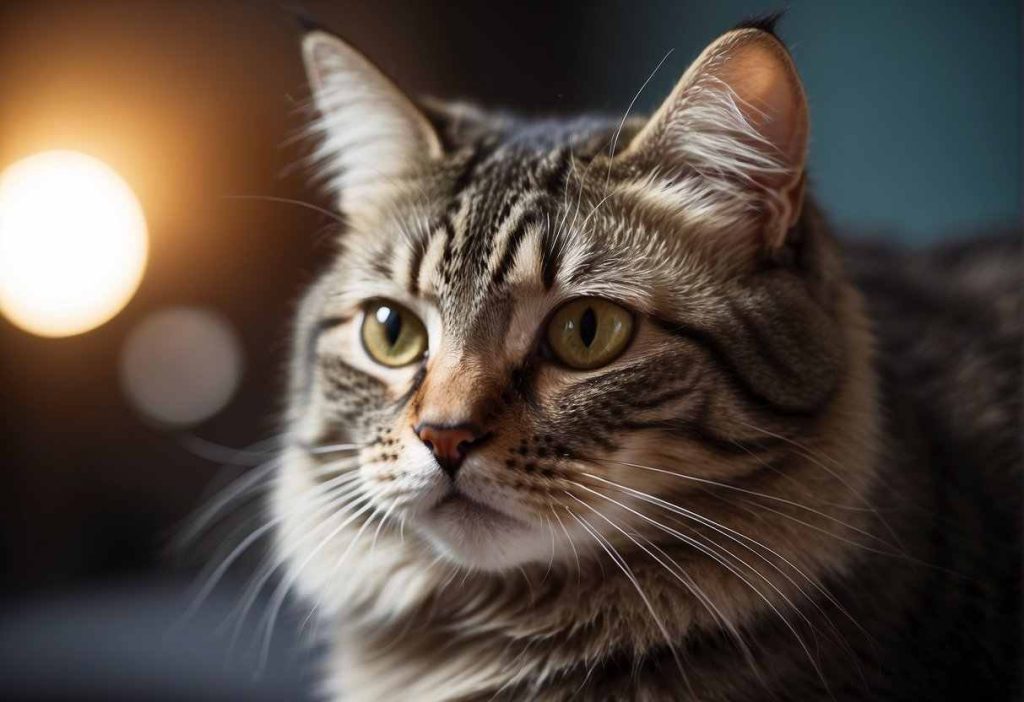
It’s true, the purr can be both a comfort and a conversation starter between you and your feline friend.
Yet, when that purring is paired with a raspy or wheezy sound, it could be cause for concern.
Fret not! You’re about to get the lowdown on what might be behind your cat’s congested purring and how you can address it.
Plus, you’ll learn a few tricks to keep that purr refined and your kitty in purr-fect health.
Key Takeaways
- Congested purring can indicate health issues in cats.
- It’s essential to investigate the cause of a cat’s congested purr.
- Maintaining respiratory health through preventative measures is crucial.
My Cats Purring Sounds Congested: Recognizing Congested Purring in Cats
Normal vs. Congested Purring:
- Normal Purr: Smooth, continuous, soothing vibration (1)
- Congested Purr: Raspy, crackling, uneven tone
Listening Closely:
- Increased effort or strain in your cat’s breathing while purring
- Any wheezing or crackling sounds that disrupt the usual purring pattern
If your usually melodious kitty sounds like they’re purring through a pillow, it’s a sign something might be up.
But don’t fret! Recognizing these changes is the first step towards getting your cat the help they need.
Strategy for Identification:
- Comparison: If possible, compare the sound to previous recordings of your cat’s purr
- Frequency: Note any changes in the frequency of your cat’s purring
- Behavior: Observe if there’s a correlation between purring patterns and specific behaviors or times of day
Remember, no detail is too small when it comes to your feline friend’s health.
If you’re unsure about the sounds you’re hearing, a quick trip to the vet can bring peace of mind.
Keep those ears perked and those purrs clear, and here’s to many more happy vibrations with your whiskered companion!
Causes Behind Congested Purring
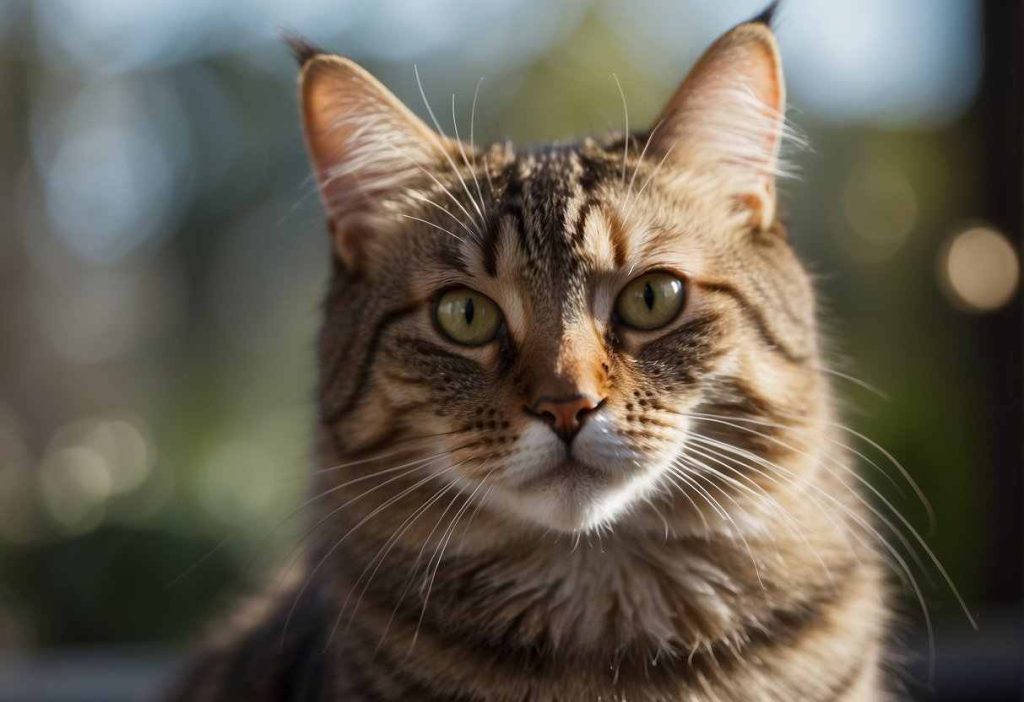
Your kitty is likely dealing with some congestion. But hey, don’t fret! Let’s navigate through the possible causes like Sherlock with a magnifying glass.
First up on the list is the pesky respiratory infection. It’s like the common cold but for cats. Symptoms can include sneezing, coughing, and a runny nose – the whole nine yards. (2)
Pesky viruses or bacteria are usually the culprits here. (3)
Next, we have allergies. Yes, your whiskered friend can get them too!
Just like humans, cats can be allergic to things like pollen, dust, or certain foods, leading to inflammation and that snuffly purring sound. (4)
Last but not least, let’s talk about obstructions. A blade of grass, a small toy, or even a hairball could be the unexpected guest in your cat’s airways making their purring go from soothing to concerning.
| Possible Cause | Impact on Purring | Other Symptoms |
|---|---|---|
| Respiratory Infections | Causes congestion and noise | Sneezing, cough, runny nose |
| Allergies | Leads to inflammation | Itchy skin, sneezing |
| Obstructions | Blocks airways | Gagging, coughing |
Catching these signs early can make all the difference.
It’s not just a quirky trait; it’s your cue to keep an ear out for your kitty’s health!
And remember, if your cat’s purring doesn’t clear up, your vet should be your next chat. They’re the pros that can diagnose the issue and get your feline friend back to their smooth purring self.
Addressing Congested Purring
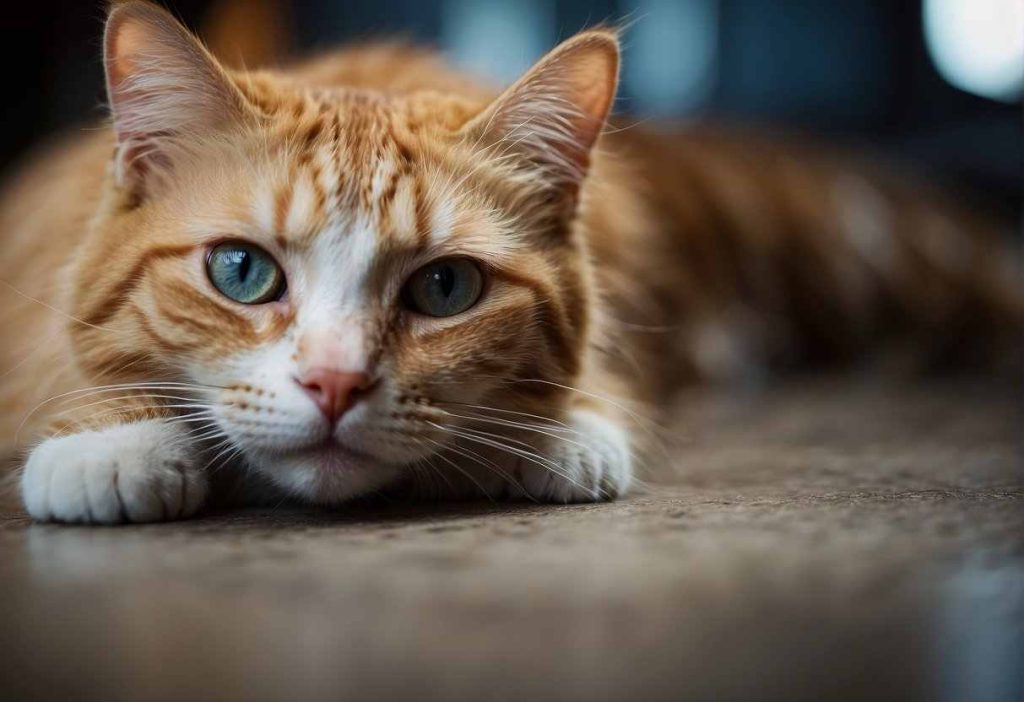
Immediate Steps and Home Remedies
Could your cat have just finished a sneaky snack? Sometimes, a hairball or a bit of a rushed meal can throw a wrench in their purring engine.
Here are some immediate steps:
- Keep them hydrated. A water fountain can encourage drinking. (5)
- Try a bit of warm air from a humidifier.
- Gently stroke your cat’s throat to help alleviate irritation.
And remember the don’ts:
- Never give human medications.
- Don’t overlook continuous symptoms.
Long-Term Management and Care
Feed your cat a balanced diet, and monitor their purring over time.
Remember, cats can be sensitive to changes in their environment.
Here’s what you can do:
- Maintain regular vet check-ups.
- Incorporate omega-3s for respiratory health. (6)
- Keep a pet diary: any changes in the purr?
Tips to consider:
- A quiet environment reduces stress.
- Avoid smoking around pets, it’s not cool for their lungs.
Remember, your furry friend’s health is a priority, even when it comes to the music of their purrs.
Keep these tips in your ball of yarn, and you’ll be a feline fine friend!
Preventative Measures for Respiratory Health
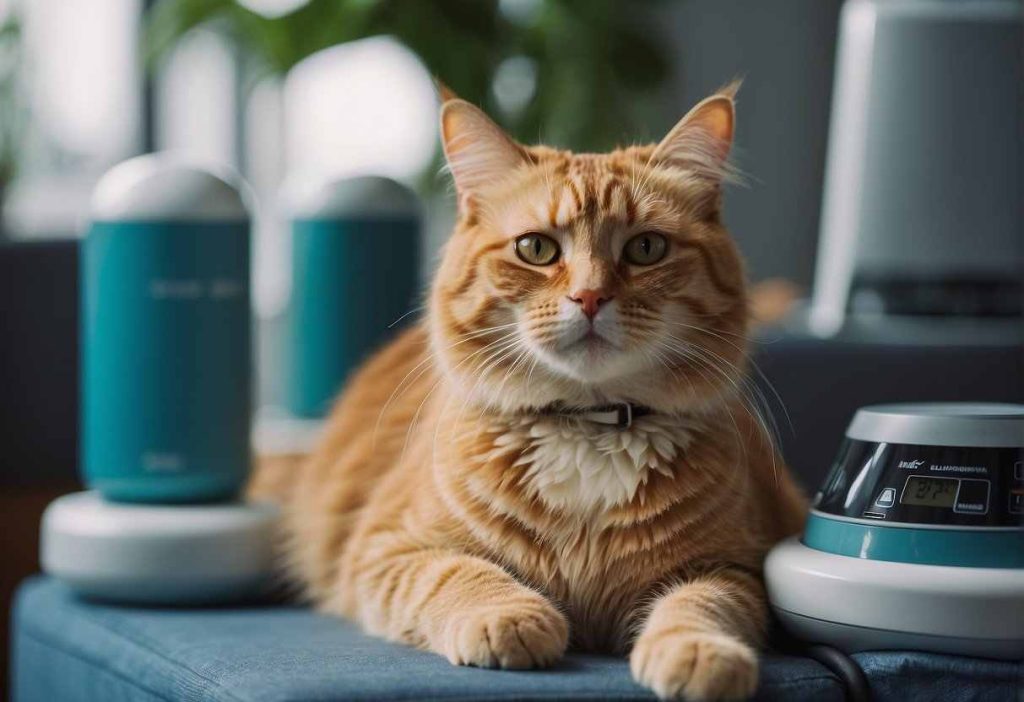
Routine Vet Visits
- Why?: To catch any issues early!
- How Often?: Yearly check-ups
Regular vet visits are like your cat’s personal pit stop; they keep everything running smoothly under the hood.
Vaccinations: Your Cat’s Health Shield
- Core Vaccines: Rabies, Feline Distemper (Panleukopenia), Herpesvirus, Calicivirus (7)
- Frequency: Follow your vet’s schedule
Immunizations aren’t just a legal hoop to jump through – they’re your kitty’s knight in shining armor against sneaky germs.
An Allergen-Free Throne
- Cleanliness: Vacuum and dust often
- Smoke-Free: Keep their air as fresh as their litter box
- Filters: Consider HEPA air purifiers
A clean home is your cat’s sanctuary from tiny airborne invaders. It’s like a majestic castle, where allergens dare not tread.
Humidity: The Unsung Hero
- Ideal Range: 30%-50%
- Think of maintaining humidity like watering a plant – not too much, not too little, just perfect for your purring pet.
Keep your cat’s environment as comfy as their favorite sunspot by steering clear of dry or damp extremes.
Remember, achieving these small victories against congestion for your cat will ensure their purrs remain the comforting symphony you adore.
Expert Insights and Community Support
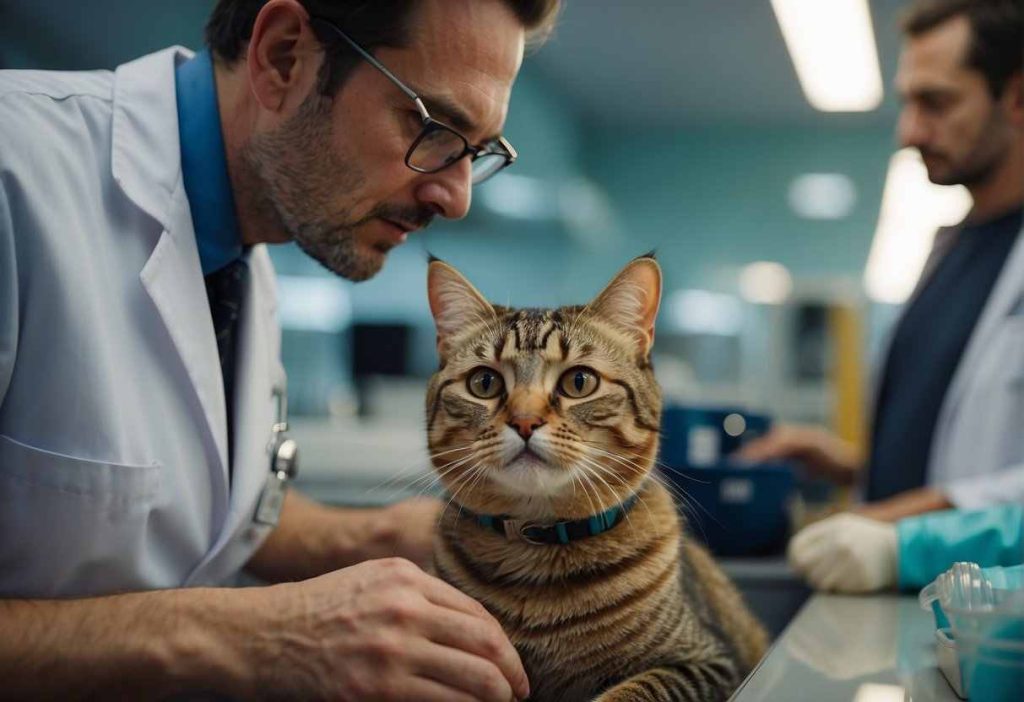
It’s like listening to a car engine that could use a tweak. That mild whistle or crack in your buddy’s purr could signal time for a check-up.
Veterinary experts know their stuff, so if those purrs don’t sound right, guess who’s on speed dial? The vet, of course!
When your furry friend is more snore than purr, here’s a breakdown of steps to take:
- Observe: Note any changes in behavior or appetite.
- Document: If you can, record the sound.
- Consult: Touch base with your vet; they’re like detectives for pet health.
Here’s a quick table for easy reference:
| Action | Reason | Outcome |
|---|---|---|
| Record purr | To provide examples to the vet | Accurate assessment |
| Vet visit | Professional health evaluation | Proper diagnosis & care |
Lean on your fellow cat-loving companions in online communities. It’s a purr-fect way to share tips and tricks!
Imagine, a virtual coffee shop where stories and advice flow as freely as the free Wi-Fi. Handy, right?
You might find someone who’s been in your shoes, or slippers, should we say.
- Did they see a vet?
- What was the outcome?
Italicize this in your mind: Sharing is caring. It can be comforting and super valuable.
So, let’s funnel that collective wisdom and get back to warm, fuzzy, and clear purring sessions, shall we?
Quick Recap
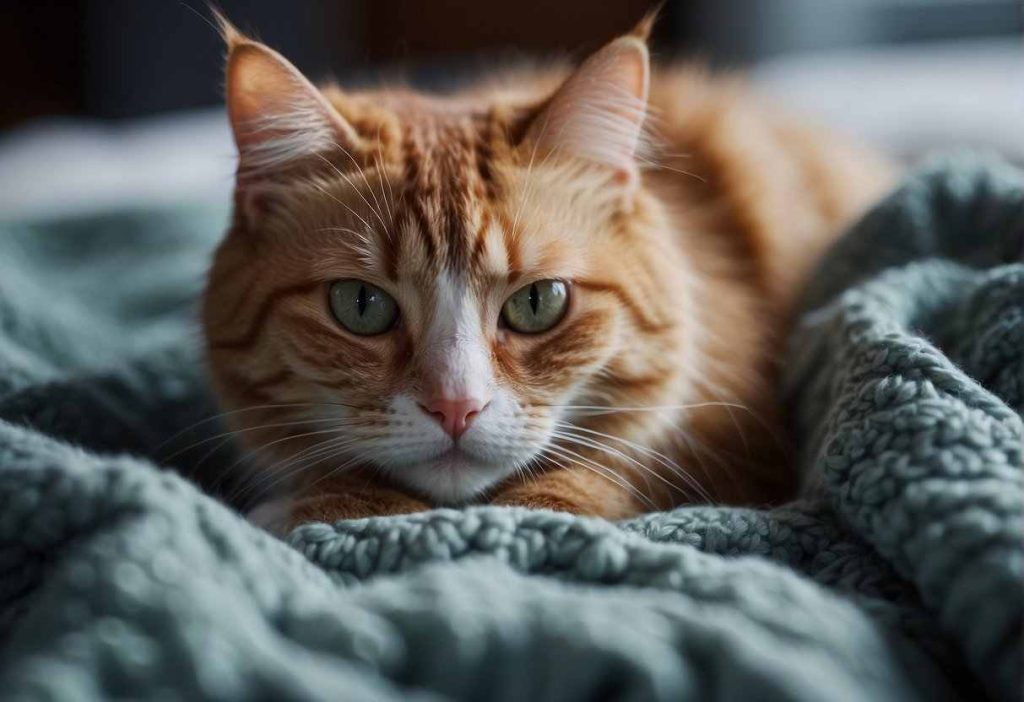
Key Insights:
- Understanding Congested Purring: A congested purr can be a hint that your cat isn’t feeling their best. It could be due to a cold, allergies, or something more serious.
- Looking for Signs: Besides the congested purr, pay attention to other symptoms such as sneezing, coughing, or discharge from the eyes or nose.
What To Do:
- Monitor Your Cat: Keep an eye on their behavior and any changes in their purring.
- Home Care: Ensure they’re comfortable and hydrated. Sometimes, a humidifier can help.
- Seek Professional Advice: If symptoms persist, reach out to your vet. Better safe than sorry, right?
- Noteworthy Numbers: No numbers were specified, so we’ll skip this part.
- Sources and Studies: Specific sources or studies haven’t been mentioned, so we’ll move on.
- Examples and Case Studies: There are none provided to highlight.
Remember, your cat’s health comes first. So, if you’ve got that gut feeling that something is up with their purr, trust it and act on it.
Your cuddle buddy will thank you!
Keep those eyes peeled and ears open to ensure your purring pal stays happy and healthy.
Frequently Asked Questions
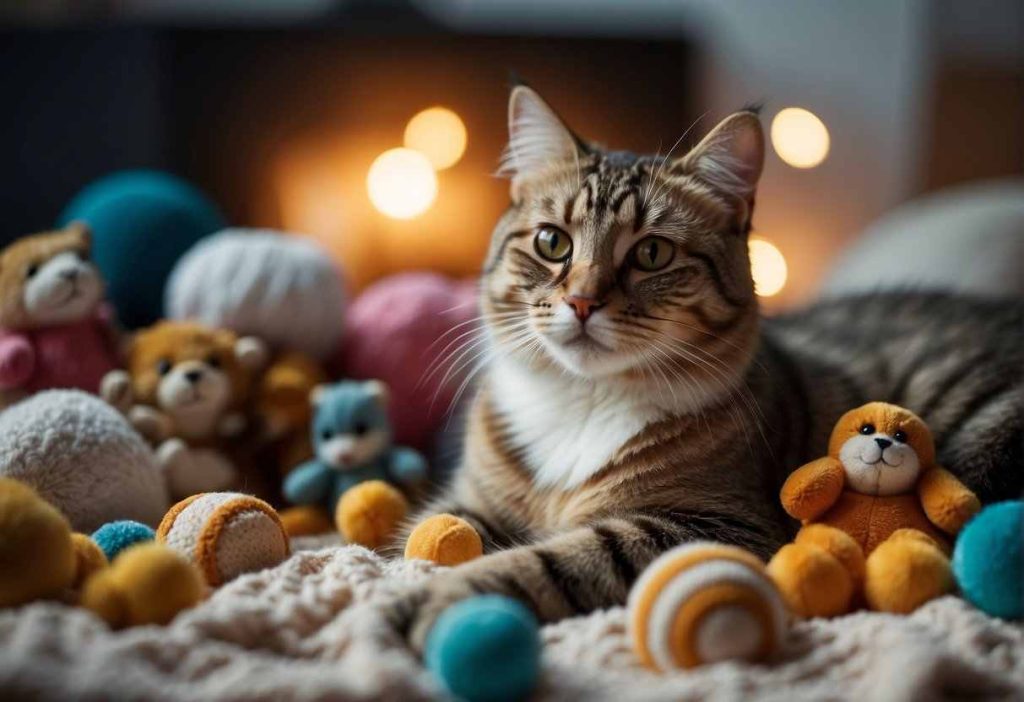
If you’ve noticed your cat’s purr sounding a bit off, you probably have plenty of questions. Here’s a quick dive into some common queries about congested purring and what it might indicate about your feline friend.
What does congested purring in cats typically sound like?
Congested purring may sound like your cat has a bit of a stuffy nose or as if there’s a rattle in their throat.
Instead of a smooth, consistent purr, there might be some crackling, wheezing, or heavy breathing sounds mixed in.
What could be causing my cat to sound congested when they purr?
Your cat’s congested purring could be due to a variety of issues such as an upper respiratory infection, allergies, or even a foreign body stuck in their nasal passages.
Additionally, conditions like polyps or tumors could be culprits.
Can congested purring be a sign of a serious health issue in cats?
Yes, it can be.
Though sometimes it’s just a minor issue, congested purring can also signal more serious conditions like infections, polyps, or breathing problems due to heart conditions.
If it persists, you should definitely have your vet check it out.
My cat’s purr sounds wet and snore-like – is this normal?
Snore-like purring that sounds wet or bubbly might not be normal, especially if it’s a sudden change.
This unusual purring could suggest a respiratory infection or build-up in their airways.
What does it mean if there’s no discharge but my cat sounds congested?
Lack of discharge yet sounding congested could imply that the issue is deeper in the respiratory tract.
It doesn’t rule out infections or inflammations, so keep a close watch for any other symptoms.
How can I help my cat at home if I notice congested purring?
You can ensure your cat has a comfy, stress-free environment and clear their airways softly with a wet cloth.
Also, keeping their living space dust-free can help.
Can diet and weight management affect my cat’s purring and respiratory health?
Absolutely! Maintaining a healthy weight can reduce your cat’s risk of developing breathing issues.
An appropriate diet helps with weight management and can support their overall respiratory health.

